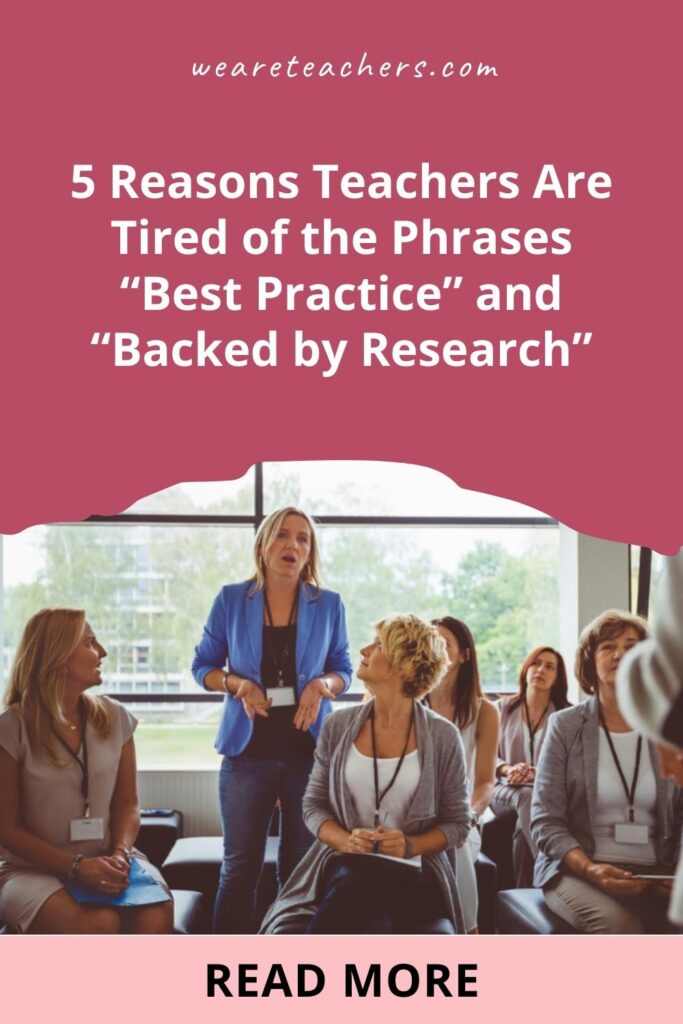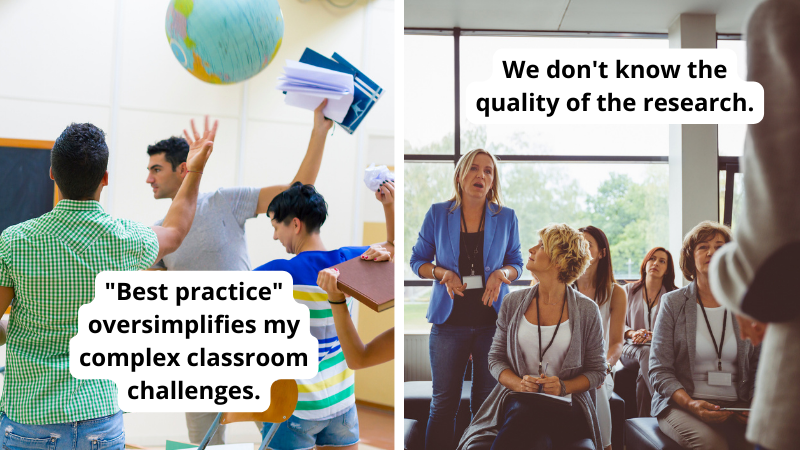As educators, we’ve all been there. We repeatedly attend professional development sessions or staff meetings and hear the same buzzwords and catchphrases. Phrases like “best practice” and “backed by research” are supposed to inspire confidence and encourage us to try new things, but for many teachers, they’ve become a source of frustration and exhaustion. I mean, really, cue the eye roll!
The truth is, these buzzwords don’t always live up to their promises. So we asked educators how they feel about these particular buzzwords and summarized below the five reasons why we’re tired of them.
1. What works in one classroom might not apply to other schools, populations, teachers, and subjects.
Education is not one-size-fits-all. In every classroom, teachers face unique student populations, subjects, and circumstances. While a teaching method might work in one setting, it may not be effective in another. “Best practices” and “research-backed” often overlook that effective teaching requires flexibility, creativity, and adaptability to different classroom settings. Districts must empower teachers to make decisions based on their expertise, knowledge of their students, and individual classroom needs. Researchers may not understand the unique needs of students. Teachers are the ones who are in direct contact with students, and we know our students’ needs better than anyone else.
2. “Best practice” oversimplifies my complex classroom challenges.
Oversimplifying a situation in my classroom with the blanket phrase “best practice” can be frustrating. As professionals who have invested years of study and experience into mastering the art of teaching, we understand the intricacies of our students and communities. We appreciate the value of research, but the reality is that every classroom is unique and requires a tailored approach. The practices presented by researchers often fail to account for our students’ diverse needs and backgrounds and may be ineffective in our specific context. As an educator, Johnathon F. teased, “Ya best practice minding your own business while I keep doing what I’ve been doing.”
3. We don’t know the quality of the research.
Teachers are rightfully skeptical when presented with the phrase “backed by research” because they understand that not all research is created equal. Plus, districts often use these buzzwords without any specific evidence or research to back them up. Simply stating that they base something on research without providing the details can be misleading and ineffective. As professionals, teachers want to know the specifics of the research, including who conducted the study, where it took place, what methods they used, and if it was peer-reviewed.
Schools often inundate teachers with numerous initiatives and programs they claim to base on research. However, without proper evidence and details, it isn’t easy to discern which ones are effective. As a result, we are weary and wondering what is legitimate and what is just another fad. And like we all have probably thought once or twice, like educator Shannon T., “Still waiting on the research that says posting objectives daily helps with learning.”
4. “Best practice” implementation is often presented as an authoritative move.
These implementations often feel like a trickled-down “We’re doing this now” instead of a collaborative experiment with us teachers. Our schools often impose new initiatives and programs without us even having the opportunity to test them out first. We want to have the chance to see how these approaches work before being expected to implement them. If we tried the new practices or strategies and collaborated on what works and what doesn’t, we would feel more invested in the process. We want a voice.
While evidence-based practices provide valuable insights and evidence, teachers cannot disregard their experiences and expertise. Therefore, it is essential to balance evidence-based practices and the practicality of implementing them in real-life classrooms to ensure the best outcomes for students.
5. I barely meet the challenges of post-pandemic teaching—I don’t have the bandwidth to add something new.
Post-pandemic teaching has presented unprecedented challenges for teachers, leaving many exhausted and overwhelmed. The constant pressure to implement new programs and strategies labeled “best practices” or “backed by research” only adds to our workload and stress levels. Instead of burdening teachers with more demands, we need support and resources to manage our current workload. In addition, teachers need time to reflect, collaborate, and develop strategies that work best for their unique classroom settings. Ultimately, prioritizing teacher well-being will lead to better outcomes for teachers and students.
The overuse of buzzwords like “best practices” and “backed by research” in education has left many teachers feeling frustrated and exhausted. While research-based practices can be valuable, it’s essential to acknowledge that each classroom is unique and requires a tailored approach. In addition, teachers have invaluable experience and expertise that should be valued and utilized in the decision-making process. School leaders and researchers should prioritize collaboration and transparency to ensure they use research to inform rather than dictate teaching practices. It’s also important to ensure that research is high-quality and relevant to the diverse needs of students and communities.
Finally, with the unprecedented challenges of post-pandemic teaching, it’s crucial to prioritize teacher well-being and provide support and resources to manage current workloads. By taking these steps, we can create a more effective and equitable learning experience for all students.
What are your thoughts on these buzzwords/phrases? Let us know in the comments!
Plus, for more articles like this, be sure to subscribe to our newsletters.


